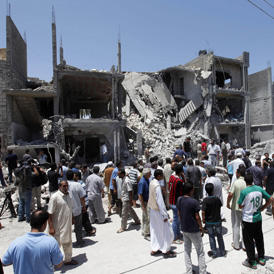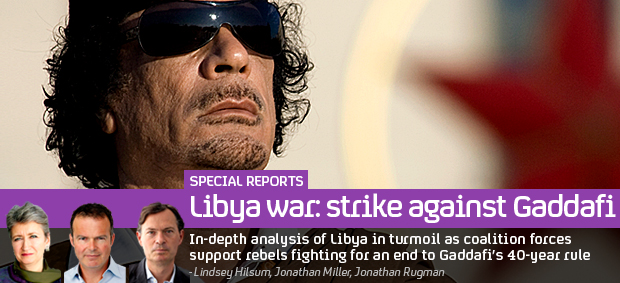Nato boss regret at loss of life in Tripoli
Nato’s Secretary General Anders Fogh Rasmussen tells Channel 4 News he regrets the “tragic loss of life” following an off-target air strike in Tripoli, but says the mission is meeting its objectives.
Nato has acknowledged for the first time that it may have caused multiple civilian casualties after a house in the Libyan capital was destroyed on Sunday, killing a number of people.
It said one missile did not strike its intended military target due to a “weapons system failure,” possibly causing a “number of civilian casualties.”
Libyan officials accused Nato of deliberately killing nine civilians in the residential area, including two children, and causing further civilian deaths in the southern town of Sebha and in Surman west of Tripoli.
Libyan Government spokesman Moussa Ibrahim said: “Basically this is another night of murder, terror and horror in Tripoli caused by Nato.”
‘Tragic accident’
Speaking to Channel 4 News, the Nato Secretary General Anders Fogh Rasmussen described the incident as a “tragic accident,” and conveyed his condolences to the bereaved families.
But he added that Nato “haven’t looked closely” at offering compensation to the relatives of the families.
Rasmussen said that despite the regrettable loss of life, Nato is on course to meeting three key objectives – ending attacks on civilians, forcing the withdrawal of Gaddafi’s forces, and allowing humanitarian access.
“We have prevented a massacre against the civilian population in Libya,” the Secretary General said.
“We have downgraded Gaddafi’s military capability, he’s not able to launch massive attacks against his people but he can still launch specific attacks and this is the reason we will continue our operations.”
After three months of military operations in Libya, the mounting cost and the loss of life have led to criticism from Nato member states.
“Time is not on Gaddafi’s side, it is not a question of if – but when – he will leave power.” Anders Fogh Rasmussen, Nato Secretary General
The Italian Foreign Minister Franco Frattini told reporters before an EU Foreign Ministers’ meeting that “Nato is endangering its credibility; we cannot risk killing civilians.”

Mr Frattini expressed concern that Nato was losing the propaganda war to Gaddafi and that Western media reports did not emphasise enough the good work done by the alliance every day to protect Libyan civilians.
The Libyan Foreign Minister, Abdelati Obeidi, said the Nato strike was a “pathetic attempt to break the spirit of the people of Tripoli and allow small numbers of terrorists to cause instability and disorder in the peaceful city.”
But Mr Rasmussen insisted that NATO would stay the course, saying: “Time is not on Gaddafi’s side, it is not a question of if – but when – he will leave power.”
“We have considerably downgraded his military capability, we have seen opposition advances, and we have seen people from his inner circle defect, and internationally Gaddafi is more and more isolated,” Mr Rasmussen said.
“This combination of strong military pressure and political pressure will lead to the collapse of the regime.”
Frozen Libyan funds to fuel rebel’s cause
The EU hopes to unlock frozen Libyan assets to help buoy the fast-depleting coffers of the opposition Transitional National Council (TNC).
EU foreign ministers said they recognised the urgent financial needs of the TNC, which has yet to receive any funding from foreign allies.
Despite the EU collectively pledging 136m euros, the TNC’s vice chairman Abdel Hafiz Ghoga said yesterday: “To this day we have not received any promised money. The mechanism is now in place and the funds should have been deposited last week.”
Meeting in Luxembourg today, EU Foreign Ministers agreed to add six port authorities under Libyan state control to the EU asset freeze list.
“In this way, the EU is taking further action against the military arsenal used by the regime against its own citizens,” Ministers said in a statement.
They added that where possible, frozen Libyan funds would be used, in accordance with the United Nations Security Council Resolution, to “support an inclusive transition process aiming at fostering national reconciliation and fulfilling the democratic aspirations of the Libyan people”.
Strikes continue
Reuters reported that a number of strikes continued in Tripoli on Monday, amid reports of more deaths at Sebha and Surman.
Libya’s official news agency, JANA, said air strikes killed four civil defence staff and wounded 10 others on Sunday when they rushed to provide first aid for people at civilian sites hit by the coalition in Sebha.
Government officials took reporters to Surman, 45 miles (70kms) west of Tripoli, to the site of what they said was a NATO strike targeting the home of Khouildi Hamidi, a member of the 12-member Revolutionary Command Council, which Gaddafi set up after seizing control of Libya in 1969.
The Libyan Government said that 15 civilians were killed, including three children. Government spokesman Moussa Ibrahim called the attack a “cowardly terrorist act which cannot be justified.”
